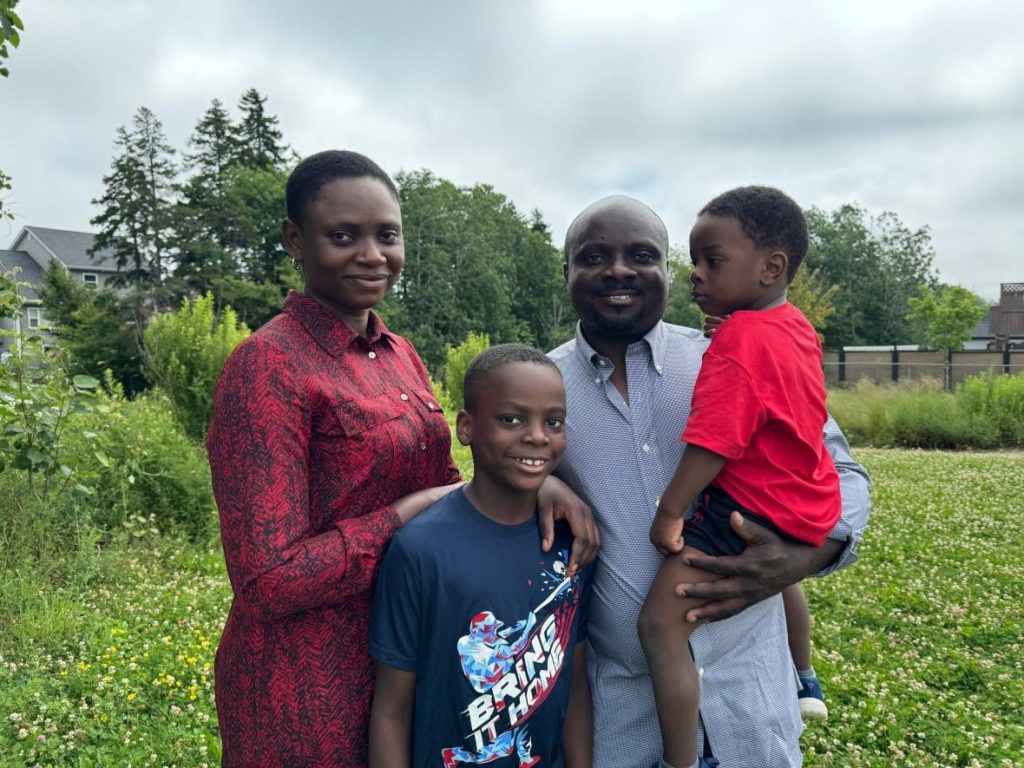Fraudulent visa: Nigerian family faces deportation from Canada over fake admission letter


•Lola (left) stands with her husband, Samson, and children David, 8, and Daniel, 3
Immigration, Refugees and Citizenship Canada has asked Nigerian student Lola Akinlade to leave the country over a fake acceptance letter she used to obtain a study visa and work permit.
Akinlade, who graduated with a diploma in Social Services from Nova Scotia Community College in 2019, shared her bittersweet experience with CBC News yesterday.
According to her, she was unaware that the acceptance letter provided by an agent for the University of Regina in 2016 was fake until she was contacted by the IRCC a few weeks before her graduation from her new institution.

•Lola
The mother of two noted that while receiving her diploma, she felt both happiness and worry upon realising that she had allegedly relied on a fraudulent document to secure her study permit, adding, “I was devastated. That was the beginning of my trauma.”
In an interview with the Canadian news platform, she said, “When the IRCC contacted me, I requested them to re-examine my case, arguing that I was a victim of a ‘rogue agent’ who supplied me with a fake acceptance letter to the Canadian school.
“Please review my file. I just want this to be resolved.”
Akinlade stated that the process of moving to travel to and study in Canada started in 2015 while she was working as a medical sales representative at a pharmaceutical company in Lagos, with a business administration degree from a Nigerian university.
She recounted meeting a man at her office who claimed to be an immigration consultant and offered to guide her through the process of becoming an international student by applying for a master’s degree in business administration.
Akinlade explained that she did not specify a particular university to the agent, only stating that she wanted to study at a reputable Canadian institution.
She described how she provided the agent with documents such as her passport and university transcripts, along with payment. Several months later, he provided her with a study permit for Canada, plane tickets, and an acceptance letter from the University of Regina.
“I flew to Canada in late December 2016, expecting to start classes in January 2017. However, I was stopped in Winnipeg en route to Regina when I received a call from the agent, who told me there were no spaces available at the university and that I would have to go on a waitlist.
Upon arriving in Canada, she began searching independently for a new school and programme and stayed with relatives in Winnipeg until she was accepted at Nova Scotia Community College for social services, starting in September 2017.
She said she chose social services because it was better aligned with her previous work in the medical field.
Akinlade stated that she did not contact the University of Regina directly until two years later, when she received a letter from the IRCC informing her that the acceptance letter was fake.
“I was sceptical after receiving the IRCC letter, thinking it might be a misunderstanding or something,” she said. “So, I immediately contacted the University of Regina.
“And that was when I learned the truth,” she added.
Meanwhile, when CBC contacted the agent, Babatunde Isiaq Adegoke, he confirmed providing Akinlade with the acceptance letter but said it was supplied by a company located in Ejigbo, Lagos State, called Success Academy Education Consult, which he had hired.
CBC exchanged text messages with Adegoke, who stated that he guided Akinlade through the process of applying to enter Canada. However, he denied telling Akinlade that she would have to go on a waitlist at the University of Regina.
Akinlade lost her study permit in Canada due to a fake letter and was denied when she attempted to apply for a postgraduate work permit and a temporary resident permit.
In March 2023, an IRCC officer wrote to Akinlade, stating that the department believed she knew the document was fake “on the balance of probabilities.”
Her husband, Samson Akinlade, and their eight-year-old Nigerian-born son, David, joined her in Nova Scotia in 2018 but have now lost their temporary resident status. Their younger son, born in Canada in 2021, has Canadian citizenship but lacks medical coverage due to his parents’ status.
“We’ve been surviving on our savings, and I don’t know how long we can continue doing that,” she said.
“It’s really, really hard,” she added.





